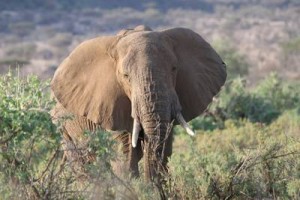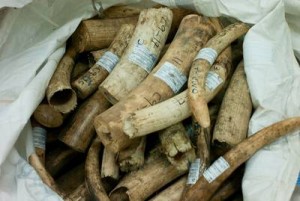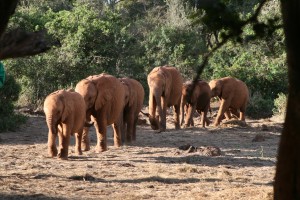BLOOD & MONEY: New report, TV special shed light on rise of illegal ivory sales

There are some who look at the majestic beauty of African elephants with a peaceful, introspective eye. They observe them in the savanna, teaching their young and dowsing their backs with cool water. Their trunks hang low as their ears flop around their wrinkled, old-man faces.
Others look at these same elephants and think two things: blood and money.
Ivory Wars, a one-hour TV special set to air on the Discovery Channel on Saturday, June 23 at 8 p.m., takes an eye-opening look at the illegal trade of ivory on the black market. From tracking the killings in Africa to the commercial prospects in China, the collaboration between Discovery and the BBC turns an uncomfortable light on a hush-hush industry that many thought was a thing of the past.
“(The BBC team) really just went everywhere, from all the different places in Africa to halfway around the world where all this ivory is traveling,” said Brooke Runnette, executive producer of the special. “It’s pretty much moving directly from the forests and savannas of Africa directly east, pretty much in a straight line. They kind of got every aspect of it, all the way down to the black market.”

Runnette said there’s a need for programs like Ivory Wars. The last time Discovery Channel aired such a special was 1989, but the problem has surfaced again. Recent statistics show that the sale of ivory has rebounded substantially in recent years. “Elephant poaching levels are the worst in a decade and recorded ivory seizures are at their highest levels since 1989,” states a report recently released by the Convention on International Trade in Endangered Species of Wild Fauna and Flora (CITES).
In 1989, CITES first issued an international ban on ivory sales, but the poaching has not ceased.
“So many Chinese nationals are moving into Africa and helping out with building things that sound like a good idea, which usually are a good idea — lots of roads, lots of development and everything,” Runnette said. “But roads also have meant that it’s a lot easier for the black economy to move stuff out.”
Although ivory is sold around the world, Runnette said many of the sales are centered in China, where the rare tusks have a unique cultural significance. “Ivory always has been a special luxury item in China,” she said. “Culturally it’s of great value. So, as you can imagine, the more people that have money, and a burgeoning middle class, the more people say, ‘You know, I want to have that special thing. I want my kid to have an ivory bangle, which is such a precious object.’ ”
One of the toughest aspects of the ivory trade is enforcement. “There becomes a sort of blur on stuff that’s illegal and not illegal,” Runnette said. “There are all these friendship shops in China where all legal ivory is supposed to have documentation. It’s supposed to have a piece of paper that says, ‘This ivory came from a legal place.’ The thing is anytime you have a piece of ivory, it means an elephant died. The question is: Did it die of natural causes, or did it die because somebody shot it with a Kalashnikov?”

The executive producer admitted that she’d rather not have to tell this story. But when the Elephant Trade Information System (ETIS) reports that three of the top five years for global seizure of illegal ivory were in 2009, 2010 and 2011, specials like Ivory Wars take on a different meaning. “We would love this to be so boring and over that no elephants are being killed anymore,” Runnette said. “But it’s definitely happening, and it’s just on the rise. … It’s a great black market item. You hate to say it. It’s like drugs. It’s easy to transport. The cost per pound is really nice and high. A couple of pounds of ivory is really worth a lot. It’s easy to move. It’s easy to hide.”
To show the industry from every light, Runnette credited the BBC team for capturing footage in several inhospitable locations. “They went into some dangerous places,” she said. “We did some shooting in Congo for this, no joke, where there’s a lot of warlord action going on.”
Her hope is that once the special airs certain people will be influenced to make a change. “Anything like this really has to happen at a regulatory level,” she said. “I would love to have millions and millions of people watch it, but I would really love to have especially people watch it who are actually motivated to help do something and have the power or feel like they can have the power to do something about it.”
For the average viewer who may never travel to Africa or China, Runnette offered a simple challenge: “Don’t buy ivory, or if you do encounter something that’s ivory, just say, ‘How did that elephant die?’ … You would hope that people would realize that when they see ivory, it means a dead elephant.”
By John Soltes / Publisher / John@HollywoodSoapbox.com
-
Ivory Wars airs Saturday, June 23 at 8 p.m. on the Discovery Channel. Click here for more information. Click here for the report from CITES. See below for two clips from the special.

